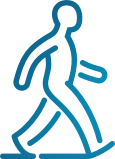Add heart-healthy habits to your routine as a starting point for improved health
Diet and exercise are a big part of managing your CV risk. Even simple, heart-healthy changes can make a difference. Choose a few tips below to add to your routine today.




Eat healthy.
As with most things in life, eating healthy comes down to preparation. Here are some useful tips whether you're home or on the go.
At home
- Double the batch of a heart-healthy recipe and freeze additional servings for future meals
- Combine leftovers—remember to keep tabs on portion sizes—to create new meals
- Chop vegetables and prepare fruit to make convenient snack packs
At work
- Eat lunch away from your desk to avoid “mindless eating”
- Bring snacks with fiber and protein so you feel full longer, like unsalted nuts, Greek yogurt, or whole-grain crackers
- Replace cream with milk or plant-based milk in your coffee. Also try lowering your sugar intake

At restaurants
- Read the menu ahead of time. If you choose a less healthy option, plan to make healthier choices for the rest of the day
- Ask for healthy substitutions or for items (like sauces) on the side
- For big portions, request a to-go container and save half for tomorrow’s dinner



Stay active.
Here are some tips to set some goals and get up and go. Remember, always talk to your doctor first before starting a new exercise routine.

Set yourself up for success
- Make clear goals by planning “what,” “when,” “where,” and “how long” for each activity
- Set your phone to buzz when you’ve reached your target steps for the day
- Remember: set reasonable expectations! Even a little more movement each day adds up
Switch up your routine
- Try a group exercise class or an online workout
- Add more movement to an everyday routine, like taking the stairs instead of the elevator
- Join an organization or charity that hosts active events like walks or runs

Find more time
- Work with your doctor to determine how many minutes of activity to aim for per week, and break that into manageable time periods (even if it’s only 10 minutes)
- Make TV time active! Walk in place, do yoga, or lift weights while you watch
- Exercise during the time of day when you have the most energy
Taking prescribed medications
- Schedule when you’ll take each of your medications, so you have a plan in place
- Work taking your medications into an established routine. For example, take them every morning after you brush your teeth
- Set reminders like a phone alert or fridge sticky note

Now, find out how VASCEPA reduces your risk of a heart attack or stroke.
Capsule is not actual size.
